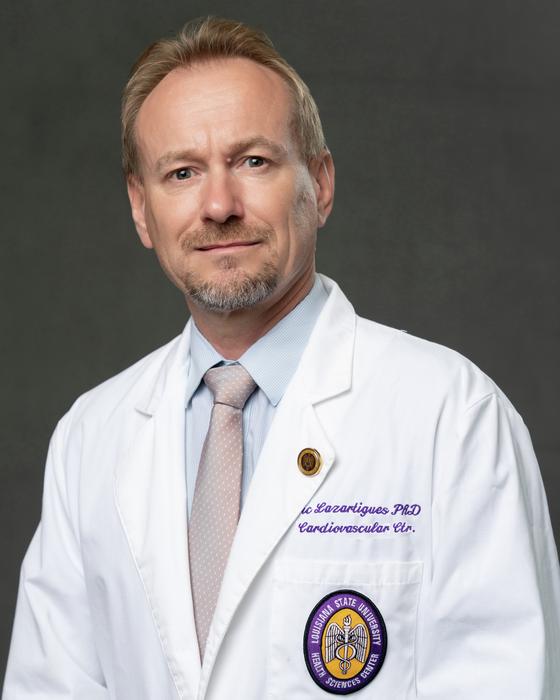New Orleans, LA — The American Heart Association’s Council on Hypertension has selected Eric Lazartigues, PhD, Director of the Cardiovascular Center of Excellence at LSU Health New Orleans, to present the 2023 Lewis K. Dahl Memorial Lecture.

Credit: LSU Health New Orleans
New Orleans, LA — The American Heart Association’s Council on Hypertension has selected Eric Lazartigues, PhD, Director of the Cardiovascular Center of Excellence at LSU Health New Orleans, to present the 2023 Lewis K. Dahl Memorial Lecture.
According to the Association, this award and lecture were established in 1988 by the Council for High Blood Pressure Research (now known as the Council on Hypertension) in honor of Dr. Dahl’s pioneering work on the relations between salt, the kidney and hypertension, and for establishing a major genetically based experimental model of hypertension (Dahl salt-sensitive rat).
Dr. Lazartigues, who is also the Louis Levy II, MD, Professor in Cardiology Research and a professor of Pharmacology, Neuroscience & Medicine at LSU Health New Orleans School of Medicine, will be honored during the Hypertension 2023 Scientific Sessions in Boston, September 7 – 10, 2023.
“With prevalence as high as 55% in individuals aged 55 and older in the United States, hypertension is a major risk factor contributing to cardiovascular diseases and global mortality,” notes Dr. Lazartigues. “Importantly, despite all the antihypertensive medications currently available, 36 million American adults living with hypertension do not have blood pressure under control. Consequently, hypertension remains an increasingly important medical and public health issue.”
High salt consumption has long been recognized as a risk factor for the development of hypertension. Dr. Lazartigues’ group is investigating the role of the brain renin-angiotensin system (RAS) in central blood pressure regulation and salt-sensitive hypertension development.
His research group was the first to identify the presence of a new protein (ACE2) in the mouse brain. ACE2 can degrade the hormone, Angiotensin-II, in the brain. Angiotensin-II can increase blood pressure by acting in the brain and on blood vessels. Hypertension and other cardiovascular diseases are often treated with drugs designed to block the production and action of Angiotensin-II. Dr. Lazartigues’ group showed that brain ACE2 contributes to the reduction of sympathetic drive and, therefore, blood pressure. After showing that brain ACE2 is suppressed in salt-sensitive hypertension, the Lazartigues’ group was the first to identify two mechanisms responsible for the loss of ACE2 compensatory activity.
Dr. Lazartigues has been leading the field regarding ACE2 compensatory activity and salt-sensitive hypertension. His research has been published in major journals in this field — Hypertension, Circulation Research and Cardiovascular Research, a testimony to the highly clinical relevance of his work. He has trained several individuals who have also become highly successful. He has been a member of the American Heart Association since 2000 and has attended the annual Council on Hypertension Meeting since 1999. He is also a local supporter of the American Heart Association.
________________________________________________________________________
LSU Health Sciences Center New Orleans educates Louisiana’s health care professionals. The state’s flagship health sciences university, LSU Health New Orleans includes a School of Medicine with campuses in Baton Rouge and Lafayette, the state’s only School of Dentistry, Louisiana’s only public School of Public Health, and Schools of Allied Health Professions, Nursing, and Graduate Studies. LSU Health New Orleans faculty take care of patients in public and private hospitals and clinics throughout the region. In the vanguard of biosciences research in a number of areas in a worldwide arena, the LSU Health New Orleans research enterprise generates jobs and enormous economic impact. LSU Health New Orleans faculty have made lifesaving discoveries and continue to work to prevent, advance treatment, or cure disease. To learn more, visit http://www.lsuhsc.edu, http://www.twitter.com/LSUHealthNO, or http://www.facebook.com/LSUHSC.
###




